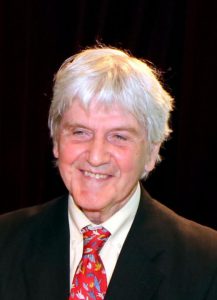To Nihon Hidankyo, winner of the Nobel Peace Prize: Steven Leeper, former chair of Hiroshima Peace Culture Foundation, says A-bomb survivors’ firsthand experiences resonate with Americans
Nov. 22, 2024
We should make greater efforts to directly convey A-bomb survivors’ voices
Steven Leeper has been living in his house in Atlanta, Georgia, in the United States since 2023. An American acquaintance told him the Japan Confederation of A- and H- Bomb Sufferers Organizations (Nihon Hidankyo) had received the Nobel Peace Prize.
I was very happy. I thought this timing was appropriate for receiving the award. There are constant conflicts in the world, such as Russia’s invasion of Ukraine and the Israeli military’s attack on the Palestinian-controlled Gaza Strip, that increase the risk of nuclear weapons being used. Now is the time for people to reflect on the significance of abolishing nuclear weapons, as called for around the world by Nihon Hidankyo, and to take action.
The award of Nihon Hidankyo was reported by major television networks and newspapers in the U.S., and the majority of Americans heard the term the “Japan Confederation of A- and H- Bomb Sufferers Organizations” for the first time. While the award drew interest in the activities of A-bomb survivors, this interest unfortunately shifted away due to the U.S. presidential election soon afterward.
Donald Trump, a proponent of nationalism, will return to power as the next president of a nuclear superpower. Some peace activists in the U.S. are reportedly concerned about his statements and actions, which could go against the abolition of nuclear weapons.
The Nihon Hidankyo’s award of the Nobel Peace Prize will have little impact on the Trump administration. Looking at the personnel of the new administration, all the people have a strong tendency to want to promote war, and in the first place, Trump himself likes a culture of war, in which things are decided by a trial of strength. The voices around me saying we have to stop nuclear war are getting louder.
From 2007 to 2010, Mr. Leeper organized a nationwide series of A-bomb exhibitions in the U.S. during his tenure as chair of the Hiroshima Peace Culture Foundation. He visited colleges and churches across the U.S. with A-bomb survivors, supporting their efforts to share their accounts.
It was the experience in which I engaged most deeply with A-bomb survivors. The late Emiko Okada and Iwao Nakanishi shared their firsthand experiences, bearing incurable sorrow and pain, without criticizing or blaming Americans. Their demeanor resonated with Americans, and for the first time, I truly understood the power of A-bomb survivors.
Now, it may be difficult for elderly A-bomb survivors to travel abroad and share their accounts. Nevertheless, I believe we need to make greater efforts to directly convey as many A-bomb survivors’ voices as possible, while exploring ways to do so.
Mr. Leeper has continued to discuss nuclear issues with non-governmental organizations (NGO) and young people since he moved to the U.S.
I am trying to create a group calling for nuclear disarmament with students at a college in Atlanta. I also plan to send students to the United Nations to coincide with the third meeting of State Parties to the Treaty on Prohibition of Nuclear Weapons next March, and to visit Hiroshima. There are many young people in the U.S. who recognize the dangers of nuclear weapons and are trying to take action to abolish them, which gives me hope.
I would like to spread the words of the late Ichiro Moritaki, the first chair of Nihon Hidankyo: “From a civilization of force to a civilization of love.” The world’s leaders must shift their values. With the cooperation of the A-bomb survivors, I will continue to promote efforts toward the abolition of nuclear weapons from the U.S. side.
(Interviewed by Kyoko Niiyama, Staff Writer)
Steven Leeper
Originally from the U.S. state of Illinois, Mr. Leeper moved to Hiroshima in 1984 and served as the first non-Japanese chair of the Hiroshima Peace Culture Foundation from 2007 to 2013. Based in the U.S., he has continued his work in peace education and speaking to the public. He is 77 years old.
(Originally published on November 22, 2024)








